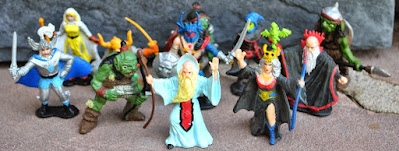Friday, April 19, 2024
Solar Queen
Wednesday, April 17, 2024
Wednesday Comics: DC. July 1983 (week 2)
Monday, April 15, 2024
The Draconic Empire
To its foes, the Draconic Empire is perhaps the greatest threat to the peace. Rapacious and destructive as the chromatic dragons that founded it, it will enslave the free peoples of the world, burning what it cannot hold, either wittingly or unwittingly enacting the vengeance of the chromatic dragon's mother, the elder god, Tiamat.
In the minds of most of the empires people, the liturgies of its priesthoods and the assurances of its diplomats, the Draconic Empire is the best hope for order and safety in a world beset by Chaos from without and enemies from within. If the Empire's hand must be firm, they contend, it is only because the stakes are so high.
What is not in dispute is that the Empire is the largest and mightiest state in the world. It was born from the rebellion against the Wizard-Kings and their allies whose sins in their pursuit of Immortality led the gods to withdraw their favor, leaving the world to its fate. After a period of war and unrest, a red dragon, mighty and cunning as any of her kind but more ambitious by far, seized a throne for herself and declared her empire. Many other chromatic dragons bowed to her, as did their kin and faithful minions, the hybrid Dragonborn. The Empress and her closest dragon supporters interbred with humans, creating sorcerous bloodlines, the Great Houses, who administer the Empire to this day.
The dread, red Empress has not been seen in some time. Officially, she has gone into seclusion to better focus her efforts on some great endeavor or another, but there are rumors that she simply disappeared and no one knows whither or why.
Friday, April 12, 2024
Where'd the Grot Go?
Watching Delicious in Dungeon and Frieren: Beyond Journey's End (which are both great, so watch them), I've noted that both display very D&Dish world, but ones completely without even token gestures toward the gritty and grime of Medievalism. They are grot free, nothing like this to be seen:
This could be put off to the style of anime or cultural differences between U.S. and Japan, but I noted this same thing back in my review of Dungeons & Dragons: Honor Among Thieves. Compared the production design and costuming of that film to something like Excalibur (which is pretty gritty despite all that gleaming plate) or even Jackson's Lord of the Rings.
I think it's even in the art of a number of 5e products, too, and in The Legend of Vox Machina animated series (at least the parts of it I've seen).
I'm sure there are counter examples, but these are fairly high profile works in the D&D world, some of them official, so I think we're in a moment where D&Dish fantasy worlds partake of more of a fairytale feel, perhaps, in regard to depict of their environments. Nothing wrong with that, really, just an observation.
Wednesday, April 10, 2024
Wednesday Comics: DC, July 1983 (week 1)
Monday, April 8, 2024
The Elements of Generic D&D
Over the years since its creation, the standard mode of D&D has become a subgenre of fantasy unto itself, codified now in the other rpgs that followed on its coattails and the other media they've inspired. GURPS terms it "Dungeon Fantasy," though I don't think it required dungeons--though obviously they play a big part.
- The primary characters are a loose group of companions.
- Well-defined character roles/types and capabilities, very often recognized within the fictional world.
- Characters engaged in quests or missions in dangerous locales, mostly commonly underground.
- A setting with pre-modern technology.
- Adventurers as a recognized role in society.
- A large variety of monsters, categorized and taxonomized.
- Hierarchies of capability within character types.
- The development of character abilities and capabilities over time through dangerous trials. Sometimes there are in-setting codified tiers or levels.
Friday, April 5, 2024
Xeno-File: Ythnat
 |
| Art by Jason Sholtis |
The ythnat evolved from omnivorous, beaked homeotherms. They are smaller than most known sophonts being around 1 meter tall on average. They are not above using their size and appearance to ingratiate themselves or at least appear non-threatening to others. It would be a mistake to underestimate them, however. They are "first among equals" in the Interstellar Compact by their own admission. In actuality, the o'omkaro and the hna-hunkpa are essentially client civilizations.
It has been opined that the ythnat have no laws, only obligations. Compared to human cultures, they certainly rely on complicated webs of patronage, referent power, and custom, more so than codified law. The contract, however, is always sarcosanct. The planetary political structure of the ythnat is prone to change to a dizzying degree, but the powerful merchant princes and syndicates effectively control the planetary economy and that of the entire Compact.


.jpg)



























